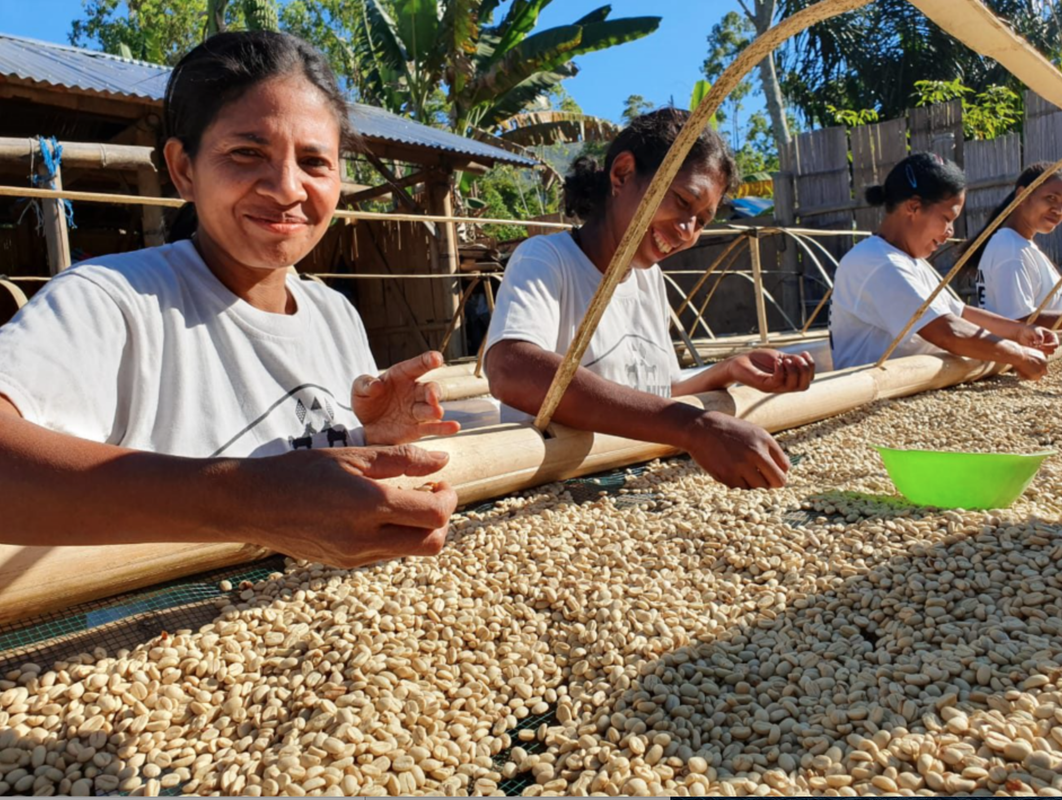Coffee
Podkawa coffee roastery is introducing a new approach to trade in intercontinental goods. We want to present you with a vertical supply chain business model, in which we minimize the number of intermediaries involved in production and transport.
In this model the money remains with the people who need it the most - the farmers. We established the Jara Mite coffee processing station on Flores Island in Indonesia, where we are cooperating and employing female coffee farmers. Thus, they benefit not only from selling coffee cherries, but also by working through the entire process. They are involved at every stage of coffee production, in opposite to the methods of other business exporters.

But why are we cooperating with people from Flores Beiposo? Flores is one of the poorest provinces in Indonesia. Education and poverty are the biggest problems in the region. Beiposo and most of the surrounding villages do not have running water. Many children are malnourished and even some of them are not able to go to school.
Usually, farmers deliver their coffee to governmental or private collection points and they are forced to accept the buyer’s terms and conditions, such as frequently delayed payment terms. Our goal is to ensure financial continuity by introducing the previously mentioned direct trade system. We offer higher rates for the raw material and we also pay for work in processing and selection of the beans. This way, farmers can earn more not only during the harvest season, but also in the off season.

Our coffee is not anonymous. Farmers are happy that people know exactly who stays behind the product and their work is appreciated in the farthest corners of the world. They willingly share their image and receive guests who want to see the making process.
Together, we introduce new coffee processing techniques and provide the opportunity to work on modern equipment. Last year, we invested in a new pulper (stationary at plantations) and a huller, (which significantly increased the quality of the beans and the production efficiency. As a result of which the quality of the beans and the production efficiency (less broken beans) increased significantly. Last year we also completed the construction of a modern warehouse, sun beds and a greenhouse for drying coffee. We supervise the entire process of making the coffee that we offer. What is more mr. Ayrton Wibowo, the owner of the Indonesian company, has developed new methods and standard operating procedures of coffee processing that allow the processes to be reproducible.
This vertical business model was very positively received on Flores Island and this year we have also established cooperation with new farmers on Java Island (which is not a common occurrence in Indonesia). This time not only coffee but also tea will be traded.

Tea
Indonesia is known as one of the most spectacular places to visit. More than seventeen thousand islands, rainforests, beautiful coastline, mountains, and lush gardens are trademarks of the Indonesian archipelago. Each tea plantation has its own unique microclimate, altitude, humidity, PH of the soil, distance from the sea and other factors that significantly affect the taste of
the tea leaves. Majority of the tea plantations are in hilly areas, where air is mild, the sun is not very strong and rainfalls are frequent. Altitude and frequency of the rain play a very important role in the taste of the tea. Drier and sunnier areas yield tea of lighter leaves and lighter flavor and aroma whereas deeper, darker color of the brewed tea comes from more rainy areas.
To offer to the market the same, unique tea all year long takes years of experience in growing, picking, storing, mixing, and transporting tea leaves. Each stage of the process can change the flavour of tea and make supply less consistent over time.
The next time you have your favourite cup of tea or coffee, think about the years spent growing plants, months of looking after each harvest, weeks of picking the freshest and best leaves or cherries and days of mixing and roasting them. Hundreds of people involved in this process live for and through tea and/or coffee. Indonesian plantations take a huge pride in excellent products they offer to customers all over the World. Be one of them. Grab a cup of freshly brewed Indonesian tea or coffee and enjoy the moment. Selamat minimum- have a great cup.
See more information and latest updates on their website. www.podkawa.pl
